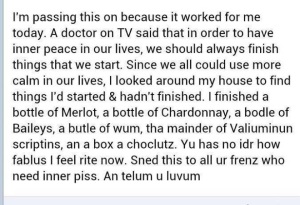-
-
-
-
-
Last installment for a while. I’m working on later chapters, and am realizing these earlier ones need some editing, which I don’t have the time to do now. I’ve posted this before, but made a few tweaks today and decided to repost. -H
_______________________
Fingers
Her name was Rose Tyler, like the 10th Dr. Who’s traveling companion.
This Rose was from New Jersey, though, and was part owner of a bar and restaurant in the old mill. She moved to Mossy Creek from a working-class neighborhood after a bad marriage ended. She’d worked as a translator at the UN. No one could learn more than that. Several had tried.
She had the air of someone who had been let down too many times. While she was friendly and exchanged sometimes vulgar banter with regulars, her eyes were always a little watchful and wary behind the smile.
Ted read her that life had not been one that lent itself to easy fantasies. More than one half-drunk male customer had learned some choice New Jersey words, too, if he laid a hand on her.
He met her the first day he was in town, listened to her conversation and quickly placed her origins and attitude. He kept his distance at first, but found that he ended up there a few nights a week after working on the house. He didn’t share much of himself, either, and resisted enough of the ways the locals had of prying without being rude. He and Rose had both been let down too many times, and each had learned to value their privacy. They circled one another, closer and closer, without words.
After a week of almost daily visits and neutral pleasantries, though, he hurried to lunch more than he used to, and she looked up and smiled when he came in, a little more than was really required. That made him happy.
On a sleepy late April afternoon, he was later than usual, held up by an argument with a painter about an estimate that had ballooned out of control. By the time he got to the Mill, he was hungry and grumpy.
The parking lot was empty, as was the bar. Rose had her back to the door and was cleaning glasses, listening to music on a stereo and obviously lost in some private thoughts. Ted recognized the song she had on, one of his favorites, “Suite Judy Blue Eyes,” by Crosby, Stills and Nash. The lyrics at the beginning were wafting around the dark corners of the old room:
It’s getting to the point
Where I’m no fun anymore
I am sorry
Sometimes it hurts so badly
I must cry out loud
I am lonely
I am yours, you are mine
You are what you are
You make it hard….
She was somewhere in her early 40s, but was fit and curvy, and her partner in the business was the chef. Ted discovered eventually, and to his delight, that Ronald already was involved with Elliot. Elliot lived in Pittsburgh where he was a TV producer, and commuted on weekends.
Rose wore a simple black skirt that flattered her hips and legs, and a starched white blouse. Her sandy-blond hair was tied up in a bun and held with a carved wooden pin, but some hair escaped confinement in a borderline wild way that he thought was charming. As she turned to put the wine glasses into the overhead rack, she turned slightly and her breasts strained against the fabric in a way that he approved of completely. He noticed she wore a plain gold chain necklace with a small cross that rested in some cleavage that was showing. He noticed that more this day because the second button was undone more than usual. He smiled to himself. Not that he hadn’t noticed her before, but that day he realized that his interest in her was something that needed to be admitted. He realized that he had stopped just inside the bar’s door and was staring, just as she caught him out of the corner of her eye, saw how he was looking at her and slowly lowered her arm smiled.
At that moment, the song slid into the next to the last stanza —
What have you got to lose?
Chestnut brown canary
Ruby throated sparrow
Sing the song, don’t be long
Thrill me to the marrow
Voices of the angels, ring around the moonlight
Asking me, said she so free
How can you catch the sparrow?
Lacy, lilting, leery, losing love, lamenting
Change my life, make it right
Be my lady
They both laughed at the same time. And then did what two people do at times like that: they pretended the moment hadn’t happened.
“Hey there,” she said, a little too brightly, “I was wondering if you were going to be in today. The usual? ”
Ted tried to move, but only managed to bump into one of the chairs at a table near the door, nearly knocking it over. He fumbled it back upright, feeling as clumsy as a teenager at his first prom. Rose seemed amused.
“Um, yes. Let’s start with an Ayinger. And could you ask Ronald to whip up a corned beef platter?”
“Of course,” she said, slight color tinging her cheeks, fumbling a bit herself as she put the order through on the computer to the kitchen and filled a frosted glass with the Bavarian wheat beer.
She slid the beer across the counter and leaned in against the inside edge with both hands.
He caught a whiff of her perfume and noticed a strand of hair dangling by one ear. It suddenly got a little harder to breathe.
“How’s the work on the house going? Still fighting with Harold about the painting bill?”
Nothing was secret in this town, especially if you were a barber or bartender.
“Harold’s been sniffing paint fumes too long,” Ted said with a wry smile, gratefully sipping the ice-cold liquid and wiping the foam from his lip with the napkin she’d put by the glass. “But I think we’ve finally got it settled. That’s what I was just finishing up. He says he’ll be done with the upstairs bedrooms in a couple of days, and that’s about all there is to do. He’d better be, too. The decorators are coming Monday to hang curtains, put the carpets down and make it all pretty and such.”
“I’ve been waiting to get an invitation to see the place, and I’m tired of waiting,” Rose said. “When can I come over and see if I approve?”
He was very aware of her proximity, and his hands felt like he was wearing boxing gloves. Picking that sandwich up was going to be a problem.
“Harold just had his deadline moved up. Give me two days. How does Thursday night sound, around 7 for a dinner? I’ve learned to be a pretty good chef since living alone.”
“I’d love that. But it’ll have to be a little later, after nine. Ronald closes up Thursdays for me anyway. Would that work? I’ll bring the wine. We just got a very nice Sirrah in from California, and I’ve been wanting to try it out.”
They talked for a bit about a wine and cheese tasting in the restaurant later in the week, and about the house. The feeling between then had subtly shifted, and both were aware of it and felt comfortable, and excited, although neither said it out loud.
Other customers came in and they broke off the conversation while she took their orders. He ate his sandwich. The dim, aged stone and wood atmosphere of the bar was comforting. It had been absorbing such moments for nearly 200 years.
Another old song was playing, a quiet instrumental he couldn’t quite place. He was tired, but found he was thinking about Thursday night with anticipation. He leaned on the bar and watched the bubbles rise in the liquid in his glass, bits of foam clinging to the sides. He took another sip.
He felt Rose’s presence return from the other side of the bar, which was in a “U” shape around a central wooden support beam and cash register. His awareness of her was of a rustling sound of cotton, a sensation of heat and a fragrance both subtle and disturbing. Rose was looking at him with an expression he hadn’t seen in a while. A nice one, one that hit him right in the male part of his brain. She was resting her hands on the bar, and moved one hand with a bar towel in a slow, back and forth motion. The surface was already spotless.
Her fingers drew his eyes for some reason. Part of his brain registered mild surprise at that. His heart beat a tune he hadn’t heard in a while. There were many things about Rose that he liked looking at, but what he looked at just then were her fingers. He was a connoisseur of such things.
It’s just like you can never mistake a girl’s knees for a woman’s. Young girls might have perfect skin and no signs of wear and tear, but experience in life is underrated when it comes to beauty. For one thing, there’s the confidence. That’s a real plus. That and no giggling.
And their knees aren’t as nice as a woman’s. These things matter to a man after a while, if he’s paying attention.
Rose’s fingers…. were not pudgy, young-girl fingers, but …womanly. The kind that comes after living a little. The kind that know what to touch, when to touch, and how long to touch; when to grab and hold on, and when to let go. Long and slender, with well-trimmed nails with a clear coating. Languid, graceful, with the beginnings of a few wrinkles. Hands that had seen hard work, but would just as naturally cradle a baby or slide beer across a bar.
Details matter.
All of this flashed through his fatigue and beer-mellowed mind in less than two seconds. Her fingers absolutely mesmerized him.
God, the raunchy truth of it was that he loved women and women’s bodies. The whole and the parts. They fascinated him. And it had been a long time since he’d thought much about that. Too long.
He reached out without thinking about it and took her hands up in his, and held them.
“You have lovely hands,” he said.
Wow, he thought. How original.
She appreciated the impulse, if not the dumb delivery. She laughed and flushed. That was a good sign, wasn’t it?
She stammered a little and managed an “oh, they’re so dry”. But she didn’t pull away. After a second’s hesitation, she rubbed her fingertips on the palm of his hand and moved her hands inside his, and then clasped his hands with an intensity that surprised him and stole any words he might have uttered.
“I’m feeling warm,” she said with a nervous laugh, and looked a little unsure. But in a flash, her body was still and her large, dark brown eyes looked right into his with a serious, but twinkly look. He had the giddy feeling that he was falling into them.
“I wonder why?,” she said.
“I’m feeling pretty warm myself.”
He actually blushed, probably for the first time since he bumped into Linda Vogel’s new boobs in the sixth grade. But he wasn’t in the sixth grade any longer, he knew what he wanted to do and, what’s more, that Rose wanted the same thing. The realization sent an electric shock clear down to his toes. She smiled a little at the corners of her mouth and tilted her head to the side a little, watching him.
Without quite realizing he was doing it, he found his fingertip gliding over the fine hair of her forearm, on the way to other things. He didn’t care who else was in the bar, even though they were alone. The feeling of her was electric to his fingers and he was aware of every detail. She leaned closer, her eyes closing a little.
Then the phone rang. Her eyes opened slowly, regretfully and she gave a little shrug that said ‘what are you going to do?’.
No more for now.
But soon. Soon.
They smiled at each other knowingly as she answered the phone, which was right behind the bar next to the cash register. He softly kissed the back of her free hand, which he still held, gathered his things and stood to go. Her throat flushed and her eyes darkened and softened. She stopped listening to whoever was on the phone.
At the door, he paused, half-turned and looked back, and pantomimed that he would call. She nodded and her smile lit up her face. Her eyes lingered on him, shining, but a little troubled, too. Then they cleared. Her lips mouthed the word “Yes.”
Outside, he felt like a schoolboy again, lighter than air. The sun was a little brighter and the birds were singing. He could feel the stock market rise, except it wasn’t the stock market.
Ah, life, he thought, giddy as a 17-year-old after his first kiss. What a grand thing it is.


























You must be logged in to post a comment.